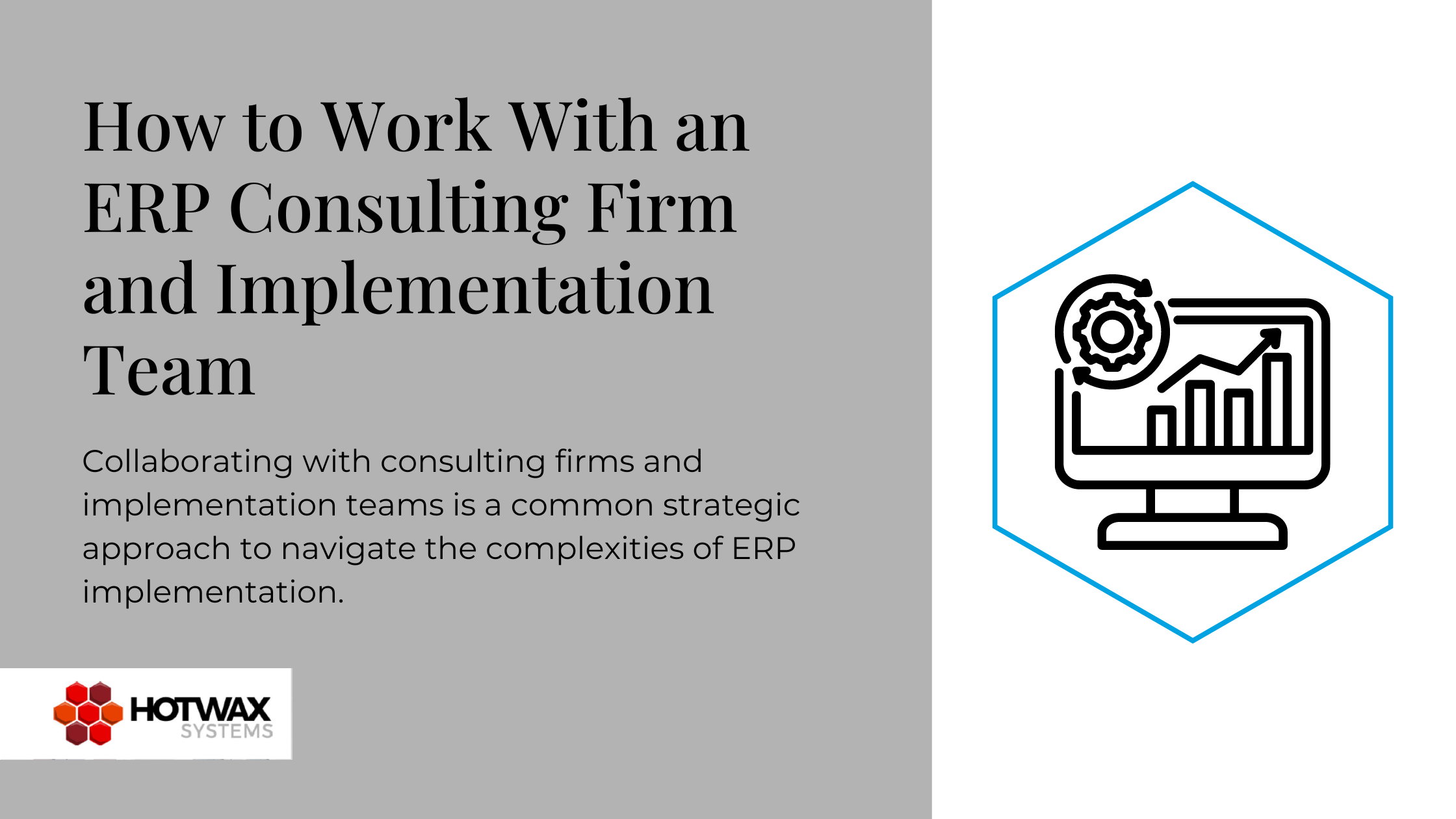ERP implementation is a complex, large and transformative undertaking for any organization. To help navigate the intricacies of this process, many businesses choose to work with consulting firms and implementation teams.
But what exactly is the role of a consultant in an ERP implementation, and how does that differentiate them from implementation specialists? How does one choose the right ERP implementation partner? What are the challenges associated with successful ERP implementation, and what are some strategies to ensure its success?
What is the role of a consultant in ERP implementation?
ERP consultants act as strategic partners to guide organizations through the entire process of their ERP implementation. You can think of them as responsible for the business analysis side of things. When working with an open source ERP consultant, they may help with:
- Needs assessment: This is where the consultants conduct a thorough analysis of the organization's requirements in order to identify gaps and opportunities for improvement. This phase is crucial to understanding the areas within the business that would most benefit from an ERP and thus involves understanding current processes, workflows, and pain points.
- Solution design: Based on the needs assessment, the consultants will come up with an ERP solution that aligns with the organization's goals (in other words, this is the part where they help select the appropriate ERP system).
- Change management: ERP implementation often involves significant organizational change on a technological and sometimes interpersonal level. ERP consultants with change management experience can develop change management strategies to help ensure a smooth transition.
- Training and support: Consultants can help train end-users on the new ERP system. This is often facilitated by assigning points of contact that act as liaisons between the consultant and the rest of the organization’s teams, which keeps communication simple and straightforward.
- Post-implementation support: Post-implementation, consultants can check in to gather feedback, and suggest improvements as needed. The extent to which a consultant does this may vary, but generally speaking they want to ensure that the ERP system implementation was, and remains, a success.
What does an ERP implementation specialist do?
ERP implementation specialists focus on the technical aspects of deploying an ERP system. You can think of them as responsible for overseeing the development aspect of an ERP project. Their responsibilities typically include:
- Configuration: Implementation consultants configure the ERP system based on the organization's requirements. If an implementation team is open source, this is where their expertise will really shine because they’ll be able to design and build custom solutions specific to that business.
- Data migration: Implementation specialists will oversee the migration of data from old, legacy systems to the new ERP platform and will make sure the transfer is smooth, accurate and complete.
- Customization: When necessary, implementation consultants can customize the ERP software to meet unique business needs. This may involve developing custom modules or integrations with other applications. Again, this is an area where an experienced open source implementation team really shines.
- Testing: The implementation team can oversee the testing phase to ensure the ERP system operates as intended.
- Go-live support: Implementation consultants are on hand during the go-live phase to address any issues that may arise. This step goes hand in hand with the training phase of an ERP implementation as they work closely with the organization's team to ensure a smooth transition to the new system.
What is the difference between a consultant and an implementation team?
While the terms "consultant" and "implementation team" are often used interchangeably, and their areas of expertise and responsibility do overlap, there are key distinctions in their roles and responsibilities:
- Consultants: Consultants are typically brought in to provide strategic guidance, assess organizational needs, and manage change. They offer a holistic view of the ERP implementation process and focus on aligning technology with business objectives.
- Implementation team: The implementation team is responsible for executing the technical aspects of the ERP implementation plan. This team can include technical consultants, developers, and even project managers who work collaboratively to configure the system, migrate data, and ensure a successful go-live.
In essence, consultants are like strategic advisors, while the implementation team executes the plan devised by the consultants.
How do I choose an ERP implementation partner?
Selecting the right ERP implementation partner is crucial for the success of your project. Make sure to consider the following factors when making this decision:
- Expertise: Look for a partner with extensive experience in ERP implementation. A deep understanding of industry-specific challenges and best practices is invaluable.
- Track record: You can assess your potential partner's track record by reviewing case studies and client testimonials to get a sense of their work quality and reputation. A proven history of successful implementations is a strong indicator of their competence.
- Team qualifications: What are the qualifications of the implementation team? Make sure they are professionals with the necessary technical skills and experience to handle the intricacies of your ERP system.
- Communication skills: Effective communication is essential for a smooth collaboration. Choose a partner with strong communication skills who can articulate complex technical concepts in a way that is easily understandable to all stakeholders.
- Support and maintenance: Confirm the availability of post-implementation support, including troubleshooting, updates, and continuous improvement as needed.
- Cost: While cost is a significant factor, it should not be the sole determinant. Focus on the total value offered by the ERP implementation partner, considering both short-term and long-term benefits, as well as ongoing costs like license fees.
Why is it so difficult to find successful ERP implementation?
Despite the potential benefits, many organizations face challenges in achieving successful ERP implementations. Common reasons for this include:
- Inadequate planning: Poor planning is a major contributor to implementation failures. Rushing into the process without a comprehensive strategy can lead to oversights and costly mistakes.
- Unrealistic expectations: Setting unrealistic expectations regarding the capabilities and timelines of the ERP implementation can lead to disappointment and even failure, which makes it essential to align expectations with the actual capabilities of the chosen solution.
- Over complication: Many ERP projects fail because the chosen system is too complicated and bulky to stick with. This can result in abandoning the project altogether, wasting significant time and money.
How do you ensure successful ERP implementation?
Achieving a successful ERP implementation requires a holistic approach that properly addresses all aspects of the process. Consider the following strategies to help guide the planning, preparation and successful implementation of an open source ERP:
- Comprehensive planning: A detailed implementation plan that covers all aspects, from needs assessment to post-implementation support, can go a long way in helping to ensure that there's a helpful structure in place as the project progresses. Make sure that key stakeholders are involved in the planning process for the best chance at achieving and maintaining project alignment.
- Executive buy in: Executives should actively support, understand and communicate the importance of the initiative throughout the organization. In other words, the why of the implementation should be clearly understood and embraced by senior leadership.
- Robust change management: Implement a robust change management strategy to help employees get used to the new system. Communicate the benefits of the ERP system, involve employees in the process and most importantly provide ample support as teams adjust to the new system.
- Thorough training programs: Prioritize comprehensive training programs to equip employees with the skills and knowledge needed to effectively use the new ERP system. Offer ongoing training and support as needed.
- Data management: Pay meticulous attention to data management to ensure accurate and complete migration of data from legacy systems.
- Realistic expectations: Set realistic expectations regarding the timeline, costs, and capabilities of the ERP system. Transparency and clear communication about the project's progress are essential for managing expectations.
- Post-implementation support: Make sure ongoing support and maintenance to address any issues that may arise post-implementation is available. Timely resolution of problems absolutely contributes to the long-term success of the ERP system, especially in the beginning when everyone is still getting used to the new software.
Conclusion
Collaborating with consulting firms and implementation teams is a common strategic approach to navigate the complexities of ERP implementation. Understanding the roles of consultants and implementation teams, selecting the right ERP implementation partner, and implementing best practices are key steps towards ensuring a successful ERP implementation.
By prioritizing comprehensive planning, robust change management, and ongoing support, organizations can unlock the full potential of their ERP systems and drive sustainable business growth.






